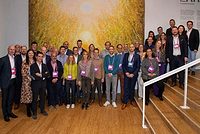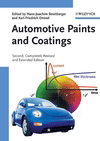AkzoNobel Launches 24-Hour Challenge to Accelerate Carbon Reduction in Vehicle Repair

Photo courtesy of AkzoNobel.
AkzoNobel announced it will launch an initiative to reduce the collective carbon footprint of the vehicle repair industry in November. The Vehicle Repair (VR) Sustainability Challenge brings together strategic partners from across the entire vehicle repair value chain, including insurance companies, fleet and lease companies, body shops and original equipment manufacturers (OEMs).
The 24-hour event will take place in Amsterdam from November 21-22, 2023. It’s the latest collaborative innovation challenge launched as part of AkzoNobel’s Paint the Future program, which aims to develop a shared approach to tackling climate change.
The company’s aim is that, by going beyond linear thinking with its partners, transparency is created across the value chain. This will help pinpoint barriers and define possible solutions to accelerate carbon footprint reduction in the vehicle repair industry.
“Collaboration will play a fundamental role in helping to safeguard our world far beyond tomorrow,” said Patrick Bourguignon, director of AkzoNobel’s automotive and specialty coatings business. “It’s about joining forces so we can push boundaries and find inventive ways to make a positive contribution to an ever-changing world. By investing 24 hours, we’ll endeavor to collectively accelerate progress towards reducing our carbon footprint. I look forward to the outcome.”
The VR Sustainability Challenge will focus on three topics:
- Energy transition – enabling faster decarbonization of the vehicle repair industry as it transitions to renewable energy sources
- Process efficiency – making key improvements across the industry
- Circular solutions – increasing circular use of materials throughout the value chain
“Everyone has a part to play in reducing our carbon footprint and collaboration is vital if we’re to make this happen and achieve our ambitions,” said Wijnand Bruinsma, AkzoNobel’s director of sustainability. “By bringing people together and fostering collaborative discussions in this challenge, we hope to spark innovative ideas for solutions that will make a real difference to our collective carbon footprint. Ultimately, this will also help create transparency and move us towards our science-based goal of achieving a 50% reduction in carbon emissions across both our own operations and the entire value chain.”
For more information, visit: www.letspaintthefuture.com.
Looking for a reprint of this article?
From high-res PDFs to custom plaques, order your copy today!







